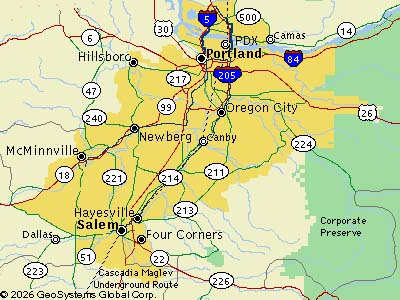 |
[Articles] [Rules] [Gear] [Lists and Charts] [Cities] [Scenarios] [Campaigns] [Other] [Links] [Evil Schemer] |
Portland:2K20Downtown Portland is maintained by the Corporations who also own many outlying housing developments. Between these suburban developments and the inner Corporate Control Zone are the downtown housing areas, most notably on the East Side. These are high-crime areas but none so much as the North-East Portland Urban Combat Zone. Corporate Police do not patrol these areas and Civil Police do so only rarely. Most of the new construction of Corporate towers and skyscrapers has occured in the NorthWest downtown area and East Portland near the Willamette River. Forest Park and Washington Park are still maintained by the Corporations as preserves and retreat areas for the corporate officers and employees. No one can enter the park areas without proper corporate i.d. and a pass. A medium-sized arcology has been constructed on Marquam Hill near OHSU. It is partially underground and cascades down the side of the hill like terraces of glass and steel. The arcology was the third constructed by EnviroCorp as a proposed new method of self-sufficient living. The Arcology is heavily guarded and it's inhabitants are well-reknowned for Net-based programming. Other interesting places to visit in Portland include Pioneer Courthouse Square downtown. Called "the City's Living Room," the square has remained in excellent condition for the past 35 years. It is surrounded by chic trendy restaurants and shops and is a clean, well-lit showcase of corporate security. The Park Blocks that form a north-south access downtown are also well-maintained and feature exciting art galleries and museums. The recently re-named Gus Van Sant Waterfront Park on the banks of the Willamette River, which bisects the city, is home to many Corporate Advertising Fairs and Annual Picnics. Mount Hood, the towering white peak to the East, is still a favorite among skiiers and Hoverboarders alike. It's many new commercial developments light the mountain at night, visible from the city as a sparkling christmas tree. Things missing from Portland include the historic Powell's Book Store, which was purchased by Zetatech in the early teens and demolished. The Japanese Gardens and the International Rose Test Gardens have both been commercialized into research concerns and are closed to the public. Many of the botanical species created or maintained at these Hydroponic facilities are proprietary and are in great demand, and therefore kept under heavy security. Many of the historic neighborhoods in Northwest downtown and South east Portland have been re-developed into Corporate Housing Developments. Plans are underway to continue development into the North Portland Combat Zone once the area has been pacified and the current inhabitants, little more than squatters, removed. Another important Portland tradition now gone is it's love of Beer. The Barley of the East-side of the state is gone due to poor corporate farming practices, and the Hops of the Willamette Valley are rendered unusable due to Acid Rain. The beer industry of Portland has all but dried up. Only a few small independent brewers remain with the rest of the demand being filled by cheap synthetic beers like Smash. MAXX Light Rail now extends north-south from Hazel-Dell to McMinville and on the East Side from The Vancouver Mall to Salem. Cascadia Maglev also stops in the Portland International Airport, which has been converted to an airship port. The farmlands to the west of the city still produce food for the populace. They are now completely automated and corporate-owned. The areas East of the Cascades have been turned into deserts due to corporate mono-crop harvests and ecological anarchy. The Cascades of Oregon remained relatively untouched while Washington has lost much of it's forests to over-logging. The Willamette and Columbia Rivers are toxic rivers of slime due to the un-checked dumping of corporate waste. There are days where the smell of the Willamette is so bad that breath masks may be required while downtown.
 The largest corporate presence in Portland is Artemis Shoes, followed by a Zetatech manufacturing plant and several local firms. Portland has historically resisted outside corporate influence and thus has fared fairly well through the 21st Century. Despite the large influx of refugees from the eastern part of the state and from California and the resulting urbanization of the areas between Portland and Salem, Portland has maintained an insular small-town attitude and continues to resist growth or expansion. The addition of millions of new residents and the disappearance of government control has put the Portland-Salem Axis in ecological jeapordy. The Corporations pay lip-service to the enviornment, protecting large areas of woodland in the Cascades and preserving many rivers and streams up-stream from Portland, but downstream is a different matter. As long as the hight-tech industries of Portland-Salem require clean water for their manufacturing, they will work to protect the forests and streams, but whatever is downsteam is of no concern. There is still a strong eco-sensitive population in Portland, but they are continually put down by Corporate Police and the corporations put on a strong propaganda campaign to convince their employees that what they do is environmentally friendly and safe, regardless of the truth.
|
| Contact Top |